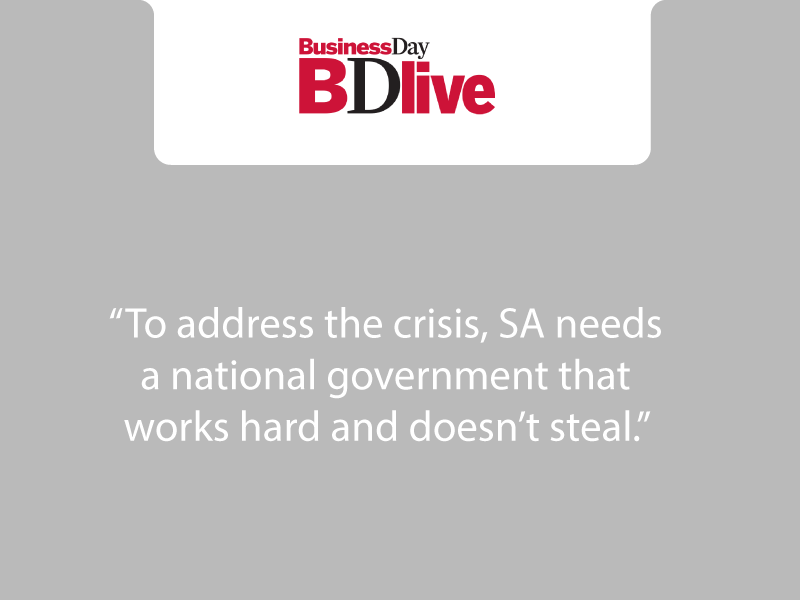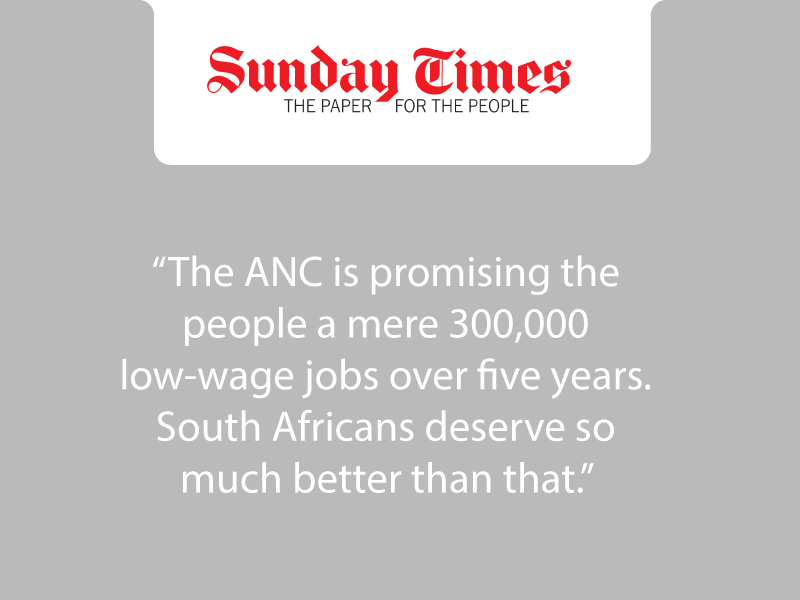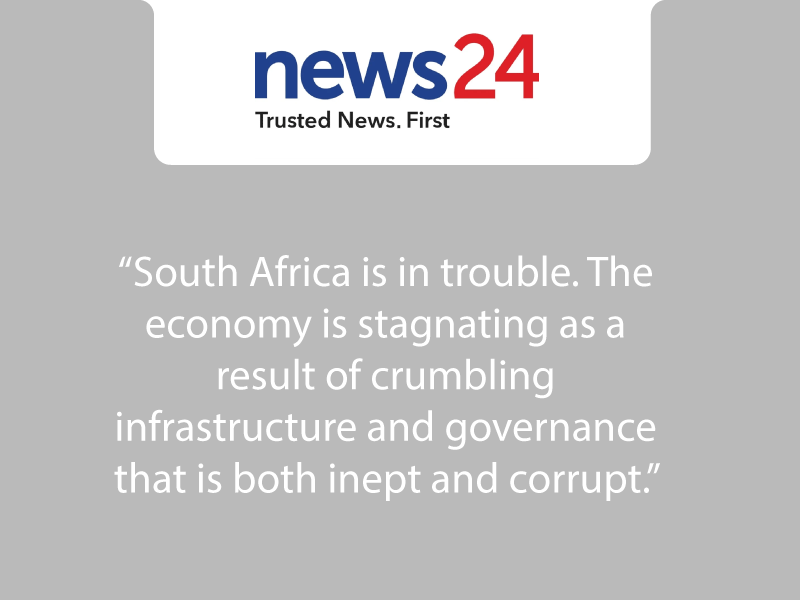
Steely determination and strong leadership are what is needed to ensure that the Government’s macroeconomic strategy (GEAR) is consistently maintained in all policies and actions.
Although the strategy has been declared ‘non-negotiable’ by President Nelson Mandela and Finance Minister Trevor Manuel, the strength of the leadership required can be seen in the current battle over the Minister of Welfare Geraldine Fraser-Moleketi’s decision to cut the subsidy for individual child support in order to spread limited resources more widely throughout the total needy population.
Click edit button to change this text.
GEAR (growth, employment and redistribution) is consistent with the strong international consensus on the efficiency of the market system. Recognising the importance of the globalised world economy, it stresses the need for a market-oriented growth strategy, fiscal discipline and investor confidence.
While not discounting an active redistributive role for the state, it sees job creation through greater labour market flexibility as the most effective and sustainable means of reducing inequality. The strategy proposes a reduction of the budget deficit from 6 per cent to 3 per cent; financial liberalisation; a programme of privatisation; and a 6 per cent annual growth rate projected to generate 400 000 new jobs by the year 2000.
There can be little doubt that GEAR is taking the most viable strategy available to the Government. The major challenges are to develop and implement consistent public policies, build business confidence, deal with organised labour and keep firmly on track.
Critical challenges
But GEAR faces critical challenges in its economic and political environment. It trades off short-term social and political costs against sustained, long-term delivery.
Economic activity is in a period of cyclical decline which is unfortunate for GEAR’s objective of attracting investment. Investor confidence is a key variable. The success of GEAR hinges on increased private sector investment, both domestic and foreign. However, surveys show that perceptions among businessmen are currently negative.
The Government must not only create an environment conducive to investment but convince business that this will be maintained for 10 to 20 years. GEAR’s hypothetical projections of 400 000 new jobs per annum and a growth rate of 6 per cent are probably over-optimistic. It is important to bear in mind that such projections are not predictions, but if politicians do not recognise this distinction they might overreact when the projections are not achieved. A government oscillating uncertainly (or seen to be) between GEAR and greater populism will create an unattractive environment for investment.
There is a close relationship between economic and political reform. Economic policy reforms lead to political complications, which in turn lead to rethinking the economic policy. GEAR has been developed by technocrats generally insensitive to political fallout as the ANC moves away from its past.
It is incompatible with the full realisation of many of the policy objectives set out by cabinet ministers and their departments in white papers during the past three years, at least as these were originally envisaged.
If GEAR is to work, all line ministries must be brought on board. Currently, links between GEAR and the ministries appear to be weak. This must be remedied. Sectoral policies must be consistent with the realities of GEAR; limits must be built into programme design and ministries will have to revisit delivery mechanisms especially by exploring private sector partnerships.
GEAR will also disrupt objectives previously set out by local governments. It has been severely criticised in certain quarters as a decisive move away from the Government’s proclaimed commitment to the Reconstruction and Development Programme (RDP).
The much stronger argument is that GEAR is a necessary precondition for redistribution through economic growth – inevitably a long-term strategy, with a 20-year horizon – whereas fiscal redistribution through government spending would be bound to fail dismally, not least because resources are severely limited.
GEAR is not an attack on the RDP, but a necessary precondition for the effective implementation of RDP objectives – redistributing opportunities and thereby access to wealth.
The Government must ensure that in as many households as possible there should be people who are employed. Policies that raise the costs of employment for employers contradict the principles of GEAR and will fundamentally undermine its chances of success.
Deregulation
There is strong evidence that a steady job of almost any sort is the decisive factor which enables families to escape from deep poverty. This will require much greater deregulation of all kinds as a matter of urgency. Nevertheless, there is also an urgent need for policies to soften the impact of unemployment over the medium term and to ensure an improvement in social services for those people who most need them. Improvements in the efficiency and quality of social service delivery would amount to the equivalent of a massive injection of resources, greater even than under the most populist expenditure programme.
GEAR needs to be driven by a strong champion in central Government. Deputy President Thabo Mbeki’s office and the Department of Finance are obvious candidates to take on this role in close collaboration with each other.
Effective public relations is essential to building confidence. This needs urgent attention. The Government has not been effective in publicising its economic successes such as tariff cuts, some exchange control liberalisation and deregulation in agriculture. South African businessmen attempting to send positive messages to the international community are frustrated by an unreceptive environment.
Enhancing receptiveness is the task of the Government. The positive symbolic, and real value of well managed events to demonstrate the Government’s commitment to investment-friendly policies cannot be over-estimated. For example: at least one large privatisation, and/or an irrevocable commitment not to raise company taxes.
Investor confidence is only one element in a wider process of confidence-building. This requires consistent policies and government actions.
Labour-market flexibility – essential to GEAR’s success – needs to become a reality. At the moment the momentum is in the other direction. The Government and ANC spokesmen need to be more consistent in the signals they send. The autonomy (almost autarchy) of individual cabinet ministers and senior ANC spokespersons is a problem.
Target group
A key target group for GEAR’s success is skilled South Africans inclined to emigrate, rationalising this in terms of crime, declining education and health facilities and affirmative action. The Government must address crime and, as importantly, make international and local audiences believe it is committed to doing so.
It must recognise that it cannot do everything it wants to simultaneously. Priorities must be set and phased. The Government must project a firm centre of gravity, which will help to increase predictability. The effects of GEAR in the short term will make it an unpopular policy. Therefore the leadership of the ANC will need to dig in its heels. A much greater awareness of the political
vulnerability of economic reform is required, but this must be balanced by the reality that the ANC has no significant political competitor now or anywhere in sight.
GEAR is a very positive strategic step by government. It makes real choices. In this regard it is different from the RDP. However, it also leaves gaps, especially in social policy and these need to be filled, not least because of the negative impact such gaps could have on GEAR itself.
Business and government need to set their priorities in relation to GEAR. Commitment to GEAR must be strengthened within government and the ANC. Business leaders must be clear about their strategic objectives, the way in which they will respond to GEAR and what support business can and will give within a complex political and socio-economic environment.
Critical choices still remain. It is significant that GEAR did not emerge from the National Economic Development and Labour Council (NEDLAC), but comes out of strong positions adopted by key players. South Africa’s institutional capacity is weak. This must be confronted, especially in government, which must develop a clear and coherent vision that is implementable; and then act consistently, courageously and with determiniation even at the risk of unpopularity.
Above all, leadership will be crucial to GEAR’s success, which in turn is critical for that of South Africa.
Ann Bernstein is the executive director of the Centre for Development and Enterprise. This article is based on the CDE publication ‘Getting into GEAR: The assumptions and implications of the macroeconomic strategy‘ (April 1997).




